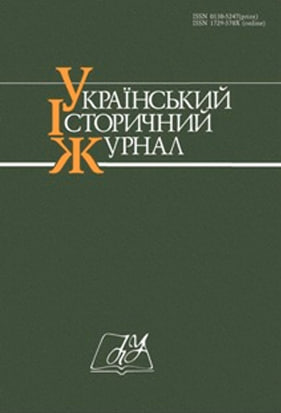Modern Sources Studies: the Status and Role in Ukrainian Socio-Humanitarian Studies
DOI:
https://doi.org/10.15407/uhj2024.02.183Keywords:
source studies, special (auxiliary) historical disciplines, socio-humanitarian studies, source unitarity, cumulative approach, tools of scientific researchesAbstract
The purpose is to formulate a modern vision of source studies, to prove its status and role as a separate science (cycle of sciences) of a socio-humanitarian profile, which has an interdisciplinary humanitarian character.
Its methodology includes the tools of many exact, natural, and humanitarian sciences. The role of source studies as a fundamental science of the socio-humanitarian field is to perform integral functions based on a multifaceted understanding of the source itself as a product of human activity in society.
Methodological approaches are determined by the application of general scientific research methods, comparative characteristics, and the use of hermeneutic approaches to the methodology of source studies as a whole complex of socio-humanitarian disciplines.
Scientific innovation lies in recognizing source studies as the cornerstone of socio-humanitarian studies, delineating ideas about the system of source knowledge as a collection of general source studies and special components in the form of historical, literary, linguistic, philosophical, legal, etc. source studies, which at the same time remain segments of their own sciences, clarifying the unitary nature with all the diversity of its forms and research tools.
The conclusions are that the sources that form the basis of any research in the socio-humanitarian branch play the role of a fundamental component of knowledge. The source needs, on the one hand, the recognition of its unitary nature regardless of the tools of which sciences are introduced for its research. On the other hand, it is extremely necessary to study it from different angles, sometimes even unexpected ones, i.e., cumulative studies. Modern source science requires the maximum application of the developments of various sciences to the study of its object, assimilation of the latest and innovative approaches to traditional and non-traditional sources, recognition of the existence in the source of not only material but also an immaterial component (mental subtext) with the possibility of its disclosure; focusing on the specifics of researching modern digital sources and sources in digital format; introduction of the latest digital technologies for the fullest disclosure of the information potential of sources.


